Religion Fosters Strong, Stable Societies, Elder Andersen Says
Contributed By Sarah Jane Weaver, Church News staff writer
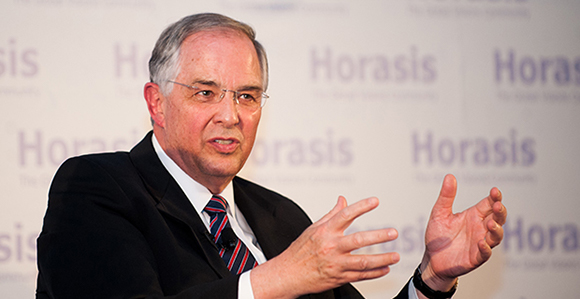
Elder Neil L. Andersen of the Quorum of the Twelve Apostles participated on a panel at the 2017 Horasis Global Meeting in Portugal.
Article Highlights
- Religion in general is a force for good in the world.
- Protecting the right of all people to worship how they wish is essential.
- If we put aside our differences, we can do great things with those of other faiths.
“[People of other faiths] are around the world, doing good, trying to help the poor and refugees, trying to be a force for peace, and we want to participate in these sorts of things with them.” —Elder Neil L. Andersen of the Quorum of the Twelve Apostles
Related Links
LISBON, PORTUGAL
If chosen freely, religion helps foster the conditions necessary for a strong and stable society—one that can better weather the ups and downs that inevitably come, said Elder Neil L. Andersen during a panel discussion at a major global gathering of business, government, and thought leaders on May 28. That’s because religion helps build social capital.
“Religion doesn’t work unless it is chosen freely,” said Elder Andersen of the Quorum of the Twelve Apostles. “We must all have the ability to choose what we want to believe or [to believe] nothing at all.”
Coming together for global solutions
For the global meetings, Horasis, an independent think tank based in Zurich, Switzerland, brought together a community of some 400 world leaders from 70 countries to pursue solutions to the most critical challenges facing corporations and societies.
Many important leaders—including five recipients of the Nobel Peace Prize—joined the Horasis global meetings.
Elder Andersen said having a Church leader included at Horasis with such impressive leaders reflects the respect many worldwide have for the Church. “As the Church moves out of obscurity, it has to take a voice in the public square,” he said.
This year, Horasis hosted a session with religious leaders, who discussed how they could develop trust, faith, and togetherness to enable progress that can absorb economic, political, and spiritual surprises originating locally or globally.
“We believe in togetherness,” Horasis chairman Dr. Frank-Jürgen Richter said. “It’s a major theme of the summit, so we’d like to involve all stakeholders—business, government, civil society, and religious leaders.”
The importance of religious freedom for all
For the session with religious leaders, Elder Andersen joined Cardinal Peter Turkson, president of Vatican City’s Pontifical Council for Justice and Peace; Canon Sarah Snyder, archbishop of Canterbury’s Adviser for Reconciliation and a theologian who specializes in Jewish-Christian-Muslim relations; and Abdool Magid Vakil, president of the Islamic Community of Lisbon, Portugal.
“It is an honor to sit on a platform alongside leaders of other faith traditions,” Canon Snyder said. “I’ve spent the whole of my life working not in a silo but actually with people outside [my] church, with different denominations within the church and with people who have no faith at all. One of the things I’m most passionate about is that we learn to turn from being back-to-back to face-to-face, but then to go out shoulder-to-shoulder.”
Echoing Canon Snyder’s comments, Elder Andersen noted that “trust and togetherness are fostered tremendously by all the religions represented here and many others across every continent.”
During his remarks, Elder Andersen asked those in attendance to consider religious freedom as essential to creating healthy societies. Quoting Will and Ariel Durant from The Lessons of History, Elder Andersen said, “There is no significant example in history of any society successfully maintaining moral life without the aid of religion.”
Setting aside our differences
He made reference to addressing several hundred Latter-day Saints earlier in the day during a member meeting in Lisbon.
With that group, he spoke about the “noble things of society.”
Most religions, he said, are “promoting good over evil, families over individualism. These are the things that make for a moral society, and we ought to promote them.”
Elder Andersen noted that in 1849, the Congress of Denmark protected religious freedom. Section 67 of the Constitutional Act reads, “Members of the public are entitled to associate in community to worship God according to their convictions, but nothing may be taught or done that contravenes decency or public order.”
This opened up Denmark to missionaries from The Church of Jesus Christ of Latter-day Saints, and more than 30,000 people joined the Church there before 1900.
“Religion has to be established freely, exercised freely,” Elder Andersen said.
Religious leaders should work together to protect religious freedom, he said.
During the Horasis session with religious leaders, Elder Andersen stressed that people of faith must set aside inevitable differences and join others in common causes for good. “These are people who are around the world, doing good, trying to help the poor and refugees, trying to be a force for peace, and we want to participate in these sorts of things with them,” Elder Andersen said of those with him on the stage.
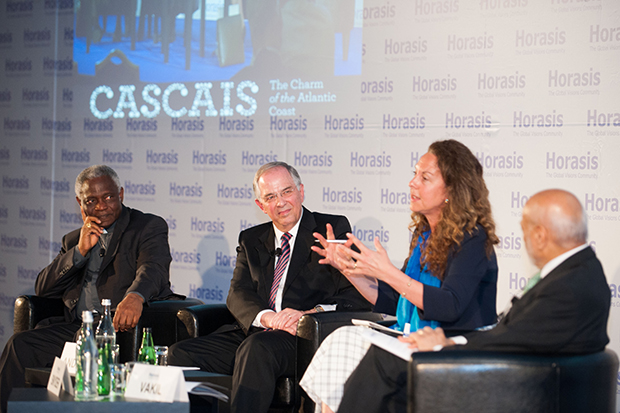
Elder Neil L. Andersen of the Quorum of the Twelve Apostles participated on a panel at the 2017 Horasis Global Meeting in Portugal.
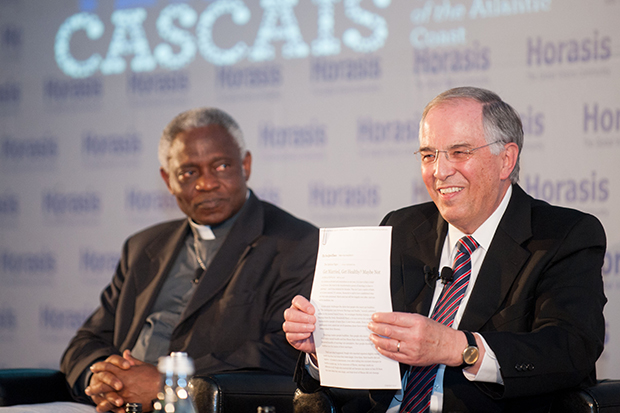
Elder Neil L. Andersen of the Quorum of the Twelve Apostles participated on a panel at the 2017 Horasis Global Meeting in Portugal.
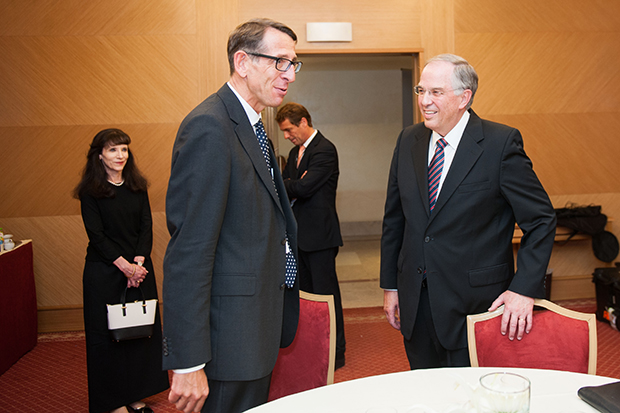
Elder Neil L. Andersen of the Quorum of the Twelve Apostles speaks to attendees of the 2017 Horasis Global Meeting in Portugal.
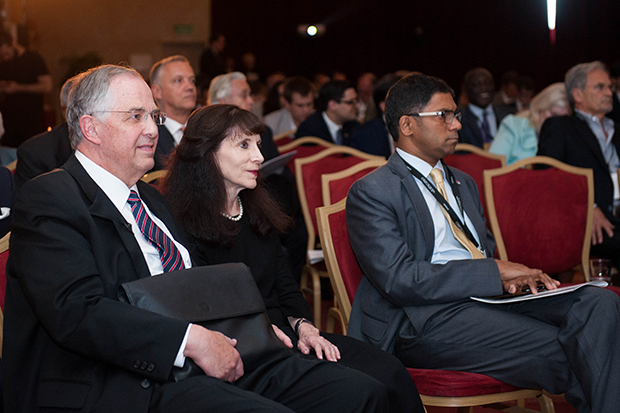
Elder Neil L. Andersen of the Quorum of the Twelve Apostles and his wife, Kathy Andersen, attend the 2017 Horasis Global Meeting in Portugal.
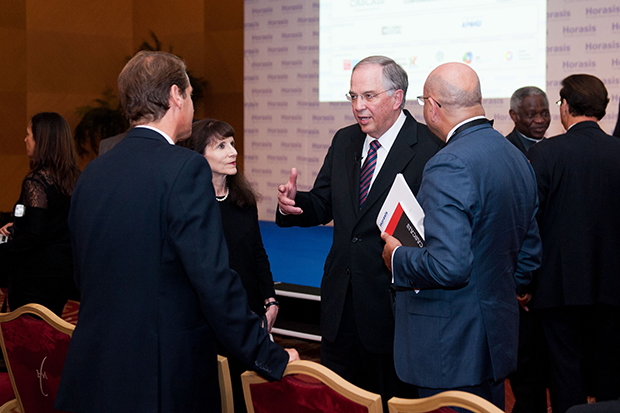
Elder Neil L. Andersen of the Quorum of the Twelve Apostles speaks to attendees of the 2017 Horasis Global Meeting in Portugal.
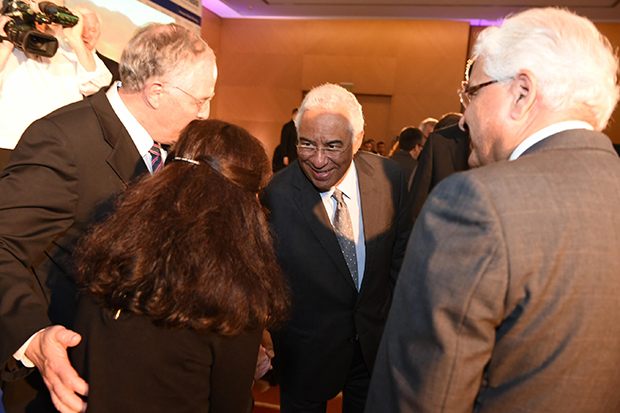
Elder Neil L. Andersen introduces his wife, Sister Kathy Andersen, to António Costa, the prime minister of Portugal, prior to being seated together at the head table for dinner during the Horasis Global Meeting.
